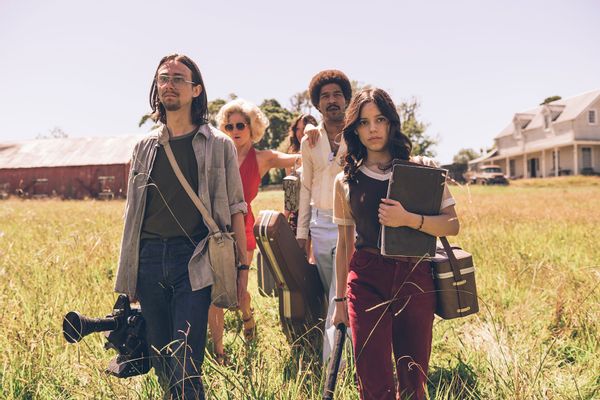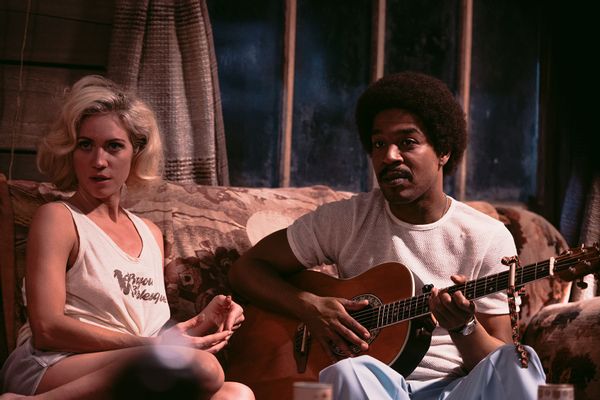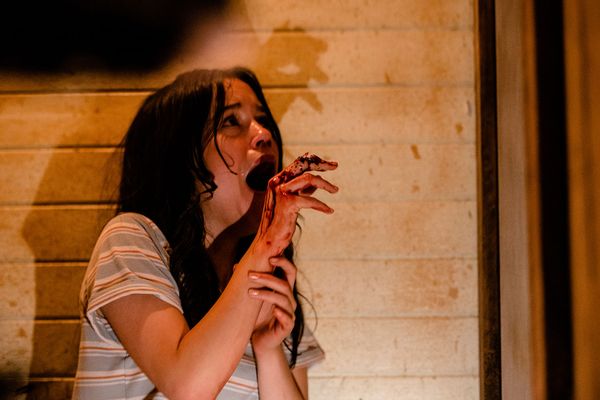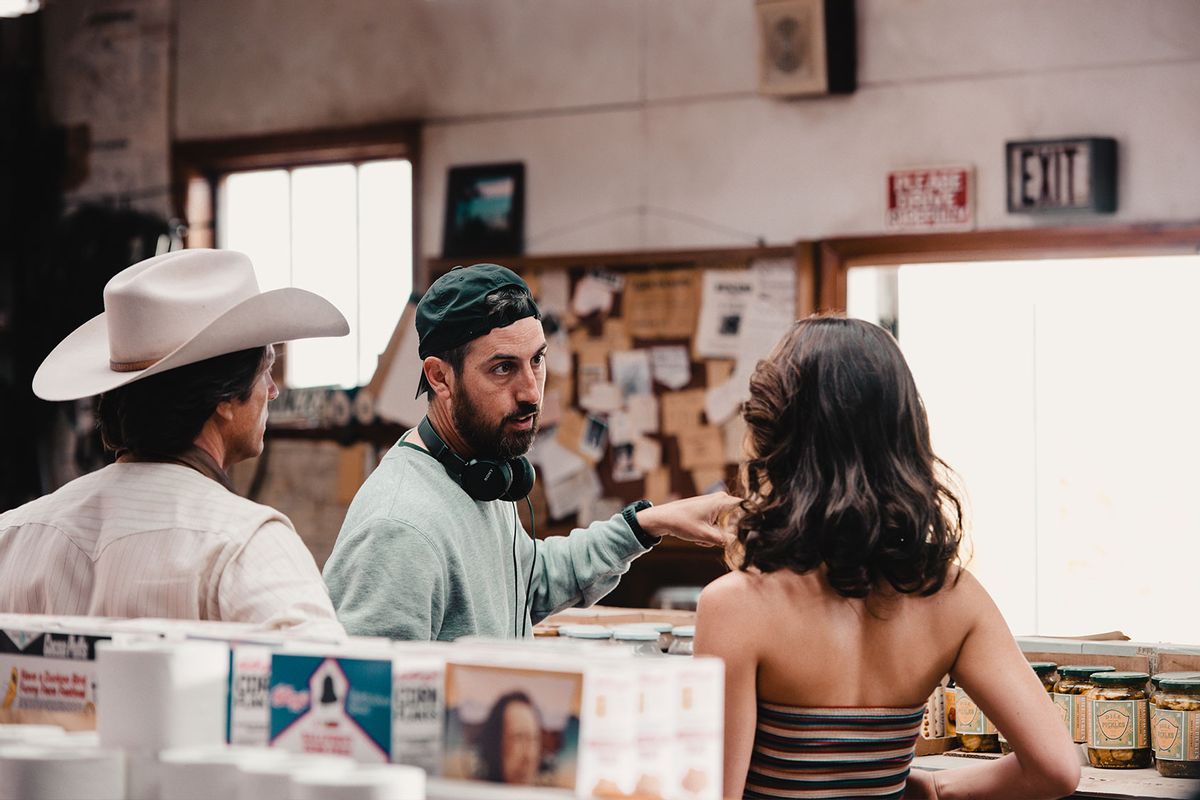Many people around the world are experiencing a living nightmare. The coronavirus pandemic has killed more than six million people. The planet is burning. Climatologists and other scientists are frantically sounding the alarm that the Earth is reaching a point of no return in terms of global warming and the resulting extreme weather that may end human civilization as we know it.
The global plutocrats are accruing even more resources and power as they profit from (and create) a dystopian present and future. This antisocial and sociopathic cabal truly are the world's puppet masters with all of the misery and suffering that implies for the rest of us.
The global right and its neofascist forces are continuing their long march to victory in the United States and other failing (and failed) democracies around the world. Vladimir Putin's Russia is waging war on the Ukrainian people. His military is committing war crimes and other acts of barbarism as millions of Ukrainians have been displaced and many thousands killed in that war of aggression. Putin is now threatening nuclear war as his forces face defeat in Ukraine.
RELATED: "Everything" star Stephanie Hsu on playing all-powerful: "We would just unleash ultimate chaos"
What is the role of horror movies (and other entertainment media and the horror genre more generally) in a time of such real-life misery and terror? Ti West's new film "X" offers an answer: it is a provocative, wonderfully absurd, exhilarating, smart, and very self-aware film about sex, aging, and the body – and the attraction(s) to violence that can turn some of us into human monsters. In the film, aspiring porn actor Maxine Minx (Mia Goth) and her producer/boyfriend Wayne (Martin Henderson) take a road trip through rural Texas with a ragtag cast and crew to shoot an adult film on the property owned by an elderly couple – Howard and Pearl – but find themselves threatened by a killer.
For horror fans – and those who appreciate smart and bold genre filmmaking – "X" is just a fun time at the movies. In a moment where so much of real life feels so very wrong and horrible, West has given moviegoers a great gift.
In this wide-ranging conversation, West ("The Innkeepers," "The Sacrament" and "In a Valley of Violence") shares the pandemic's influence on the film, capturing Texas in the 1970s, surprising film influences, thoughts on whether horror needs subtext and the film's recently announced prequel, "Pearl."
The following interview has been edited for length and clarity.
With of the challenges of this moment and the last few years, how are you maintaining your balance and being creative for a living?
I'm an only child, so I am a very self-motivated and driven person. I have that willpower to keep pushing forward mentality. In many ways when everything got locked down and people were staying home during the pandemic, I used that time to just write like crazy. I got a lot done. We made two movies during that time. During so much of the weirdness of the last two years I've been working. I just threw myself into the work. That is my personality.
How has being an only child impacted your personhood and creativity?
I can be by myself and my imagination and I'm comfortable in that place. I don't feel uncomfortable there. I'm just inventive in that regard and I'm also self-driven. If you look at any of my movies I write, direct, edit, and produce them. That is very only-child-like behavior. I'm used to doing everything myself. I feel comfortable in that space even though sometimes it's a great deal of responsibility to take on and sometimes it's easier and better to have help. But I still believe in the beginning that I am going to do everything myself. That's just my nature.
What are some of the strengths and weaknesses of that approach?
Sometimes you figure it out and sometimes you don't. It's a tricky process as they say. You don't want to drive yourself crazy – and it's easy to do that if one is not careful. You also have to make sure that the people you are asking for help are actually the best people to be asking. There are many people who on a basic level do not know how to really help you achieve your goals. I try to internalize the wisdom that sometimes a person has to know their limitations.
We have to know when to push our egos aside when it is better to have someone else take on a task who can do it better than we could ourselves. It is also good to know that you can push yourself to do more than you're already doing and to not stop at 40% or something. It's always just a balance.
 Owen Campbell, Brittany Snow, Mia Goth, Scott Mescudi and Jenna Ortega in "X" (Photo by Christopher Moss/A24)A great film is a result of a many different people working together – and also some lucky choices and happy accidents along the way. How did that come together for "X"?
Owen Campbell, Brittany Snow, Mia Goth, Scott Mescudi and Jenna Ortega in "X" (Photo by Christopher Moss/A24)A great film is a result of a many different people working together – and also some lucky choices and happy accidents along the way. How did that come together for "X"?
I was fortunate with "X" because I was able to get together a group of people who all wanted to make the same type of movie. On a basic level that is what you are really trying to do. We went to A24 first with the script. They were the first and only people I went to and they wanted to do the movie. That was great.
The entire crew were comprised of people who I'd worked with before. They wanted to work on "X," and they really got what the vision was for the film. They got the humor. They got the style.
They understood the challenge. The set and production designer, costume designer, composer, the whole team really came together. I think everybody sort of clicked in a way. Whatever department it was, everybody was there to bring their best up to another level.
Want a daily wrap-up of all the news and commentary Salon has to offer? Subscribe to our morning newsletter, Crash Course.
Was there any one moment or perhaps a few where you knew you had something special with the actors and the group of people you assembled to make "X"?
The day that everybody was done with their costume fittings. I felt good about everyone prior to then. But the day we took their first photos in costume was the moment it definitely felt like everything was correct.
Given the state of the world where so many things are broken and horrible, what does it mean to make a horror movie in such a time as this?
I don't necessarily associate them as the same thing. "X" is a pretty outrageous concept for a movie. Yes, it is certainly very violent and gory, and it is a horror movie in many ways, but it wasn't a nihilistic movie. That was a big part of why everyone wanted to be part of it in my opinion.
"X" is a really upbeat, fun, crazy night out at the movies, even though it also has these weird, dark, subversive elements too. The film wasn't really done in this dark nihilistic way. It was done in a cinematic event kind of way. My way of grappling with these matters is that I don't want people to leave the movie theater feeling awful about the tragedies of life. I'm just trying to give you a night out at the movies. "X" has some subtextual meaning of course regarding existential questions, but it is also escapism too from some of the heavier aspects of life.
What is your approach to horror as a genre on a conceptual level? The emotions, themes, the morality tale, and then catharsis and release and closure (or not)?
I understand the sense of the question, but as someone who makes movies, I just start with the story and its visual language and then it all just starts to snowball and come together. I don't start with the subtext and deep meaning of the film; I am just trying to make the movie. In terms of horror, I also don't focus on those questions too much either. Of course, there are deeper meanings on some level but that is a function of us being human beings who have made a film.
Fundamentally, I'm always just interested in a story and then I'm interested in the cinema of how best to communicate that story.
Anything beyond that is a great addition. When a movie has a deeper meaning in terms of cultural criticism or politics that makes it better and richer, but I don't begin the process by looking for that. I start by looking for an interesting story and then an interesting cinematic language for the movie.
My biggest passion in life is filmmaking and cinema so that's the way that I approach movies.
What are some of the other films that were in your mind when you were making "X"? An obvious one would likely be "Texas Chain Saw Massacre."
Oddly enough, less "Texas Chain Saw Massacre" than one would think. If you make a movie in the 1970s that is set in Texas it is hard to avoid the shadow of "Texas Chain Saw Massacre." That movie is going to be looming over you. I decided that I might as well just embrace that reality and let people think the first 15 minutes of the movie are going to be like "Texas Chain Saw Massacre" and then zig instead of zag.
When we were putting up pictures on the wall or talking about movies with the crew the inspirations were more like "Two-Lane Blacktop" than horror movies. Perhaps that is because the horror movie influence was more obvious to me, and I didn't feel the need to talk to other people about it as much. The influences also included moves like "Smokey and the Bandit," that type of 1970s Americana was more in my head than any specific horror movie.
How is Texas a character in the movie?
To make a movie about moviemaking, I wanted the film to be set in the middle of the country and in a place that had a type of entrepreneurial ethic.
I also wanted to start the story in a urban environment and then move to a rural environment. I also didn't want the setting to be too rural either. Texas has an entrepreneurial feel about it and the setting works for a story about a group of people who are trying to make a movie outside of the system. And of course, that place needed to have alligators too!
There are some scenes in "X" where I said to myself, "OK, it takes lots of money to look this cheap." In particular, I was thinking of the scenes in the van. The aesthetic of the movie is just so very intentional. It is spot on.
The choices we made were not as expensive as they could have been, but it was not like we just found a van hopped in it and began shooting the film.
We shot in New Zealand. Just to get a van from the 1970s where the steering wheel was on the correct side was a miracle in itself. The van that we got looked nothing like that at first. We completely gutted the van, completely repainted it and changed all of the inside.
All of the wardrobe was made from scratch. It was a lot of work to get that very specific feeling. Yes, the lens choices and cinematography and other details were all part of that process. There is so much to getting that feeling right. Most of it is invisible.
It was a tremendous amount of effort to get the movie to look that specific to the time period and milieu.
 Brittany Snow and Scott Mescudi in "X" (Photo by Christopher Moss/A24)"X" is a slasher movie. It is also part of the larger tradition of exploitation movies. What was your thought process about humanizing the "monsters"? How did you figure out the balance?
Brittany Snow and Scott Mescudi in "X" (Photo by Christopher Moss/A24)"X" is a slasher movie. It is also part of the larger tradition of exploitation movies. What was your thought process about humanizing the "monsters"? How did you figure out the balance?
I felt that I was subverting many of those genre archetypes through the structure of the film. I always thought of Howard and Pearl as villains – if you want to use that type of language. But I really wanted them to be human in a basic way. They are not supernatural. But I also wanted to treat them like the monsters in a monster movie but to still have some humanity in them.
As the movie develops, you can't condone anything they're doing. What they are doing is really outrageous and awful. But you as the viewer can also relate to why they're doing it. You can at least understand their resentment. I felt that was an interesting way of approaching the villains in a horror movie like "X," and one that I had not seen done very much. Likewise, Maxine as the "final girl" archetype also does not follow the typical rules for that character and trope.
Through Howard and Pearl "X" also grapples with mortality and that there are certain things that society deems as being best left for the young. Some people age very gracefully and have a great time getting older and others have a hard time with it and become resentful and angry and the like. I always thought that those themes were very relatable and therefore a good starting point for a crazy horror movie.
How did you approach the anxieties that many viewers -- and American society as a whole – may have about sex and the elderly and the aging body?
That is a function of who is watching the movie. It's a subjective experience in the sense that when we were shooting, for example the Howard and Pearl sex scene, the meaning was not lost on the folks there. There was this feeling of wow, this is an outrageous scene to be shooting today. But such a reaction then begs the question of, why?
When people can have different experiences with the movie that creates for an interesting conversation and a reason to re-watch the movie.
There's more and more to gain from "X" each time you watch it because we did spend a lot of time trying to plant little seeds throughout the movie.
The last act of "X" is wonderful spectacle. It really does tap into the core absurdity of the horror genre and the filmic imagination you were drawing from.
It's certainly intentional. And I think that I just thought of it as, OK, we're going to have these old people having sex. We still have a horror movie going on. There are so many things happening at the end of a movie that ordinarily would not, and the showdown is so very larger than life. But that is the movie the viewer signed up for. For me to worry too much about plot is to somewhat miss what is more important about the overall feeling of the movie. I've never been that interested in plot.
Plot is a good reason to set up a story. Unless you're making an Agatha Christie movie, I don't really care that much about it. But I do care about the things that happen along the way.
During one of my viewings of "X," a group of young women got up and walked out. They were very vocal and were complaining about how Pearl's physical arousal during the first kill was so "disgusting" and "uncomfortable." What types of feelings were you trying to summon within the viewer? I took their walking out as a win for the film.
People have very intense reactions. Having made a lot of horror movies sometimes you know when there is a scene that might lose some people in the audience.
Then again there are other scenes and moments where I am surprised that I lost some viewers because it never would have occurred to me that it would have been that element which did it.
What's funny to me are the number of people that would go to horror movies who would then even consider walking out. What did you think you were signing up for? I don't know what to make of it. I've never been so offended to need to walk out of a movie per se, but it happens.
Maybe that's just a testament to "X" working. My goal wasn't, "Hey, at this moment, I hope to provoke people to get up and leave the movie." But that is also a moment in "X" where things get pretty wild. If that first kill in the movie pushes it further than you were comfortable with then maybe that is in fact a good time to leave.
 Jenna Ortega in "X" (Photo by Christopher Moss/A24)When you say that "a film is working" what does it mean? How do you know?
Jenna Ortega in "X" (Photo by Christopher Moss/A24)When you say that "a film is working" what does it mean? How do you know?
You feel it. I don't watch my movies very much with an audience. That is too painful for me. But in the few times that I do, one can just feel it when the movie's working. That's what you hope for. You hope that the story lands and that the audience gets what you are trying to do.
"X" has been so warmly received by the critics. I'm very grateful for it. I'm taken aback by it in many ways. People are really enjoying the movie and having a good time with it, and "X" to me was really a love letter to cinema.
James Gaylyn and Simon Prast play the roles of a sheriff and televangelist, respectively. They have some much weight and power in their performances. How do you manage that energy, two folks who are scene stealers, when you are shooting a scene?
You let them steal the scene. For the televangelist role, it is one of those things that is just a pastiche of the movie but then then you realize the character is much more than that. To get someone like Simon who could really pull that off in a convincing, genuine way but then also stick the landing of the reveal at the end of the movie is certainly easier said than done. It is a credit to Simon for being so amazing. A lot of that performance came from his audition and the intangibles he brought to the role.
James is in the beginning of the movie and the end of the movie. I told him that he has to stick the landing on this last line. The movie's relying on you sending everybody home with the right feeling. It is a credit to him.
I told James your presence has to be known in this movie. He got it. He carried himself in a way that I was like, OK, this guy, even in this audition has a presence and when we get him in the space and I tell him what the spirit of the movie is, I know that he's go it.
There is going to be a prequel to "X." All too often in horror movies and their many sequels the "monster" becomes the anti-hero if not outright hero because he or she is the most interesting part of the story. How are you going to take on the challenge of keeping the mystery of "X" without humanizing Pearl and Howard too much?
The best answer I can give is that you will find out soon enough. "Pearl" is done. The prequel will come out. It won't be a secret for that much longer. That movie takes place in 1918 and it's about young Pearl.
It's stylistically very different from "X." You do not need to see "X" to appreciate Pearl and you don't need to see "Pearl" to appreciate "X," but they do enrich each other tremendously. There is a lot of connective tissue, even though they are standalone movies. What we do in "Pearl," it's different enough from "X," but in that spirit.
Again, I have to be cagey talking about it because we kept "X" a secret for so long and I think that's been a benefit to the movie.
The more you go into the prequel and the less you know the better, but "X" is a slasher movie. And it wouldn't be a slasher movie if we didn't make a bunch of sequels. It also wouldn't be a compelling slasher movie if the villain didn't have a little bit more lore to them than perhaps in other genres. "Pearl" exists on it's own terms and it is its own very inspired movie. I believe that if you liked "X" then you'll love "Pearl." Whatever you expect it to be, it's not.
Are monsters made or born?
That is somewhat of the question to be answered by "Pearl." It is the chicken or the egg question. It's hard to really know for sure.
"X" is currently available on demand and will be released on Blu-ray on May 24.
More stories to check out:



Shares